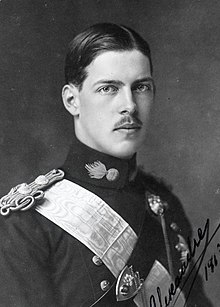| Alexander | |
|---|---|
 King Alexander c. 1917 | |
| King of the Hellenes | |
| Reign | 11 June 1917 – 25 October 1920[a] |
| Inauguration | 11 June 1917 |
| Predecessor | Constantine I |
| Successor | Constantine I |
| Prime Ministers | |
| Born | 1 August 1893 Tatoi Palace, Athens, Greece |
| Died | 25 October 1920 (aged 27) Athens, Greece |
| Burial | 29 October 1920 Royal Cemetery, Tatoi Palace, Greece |
| Spouse | |
| Issue | Alexandra, Queen of Yugoslavia |
| Greek | Αλέξανδρος (Aléxandros) |
| House | Glücksburg |
| Father | Constantine I of Greece |
| Mother | Sophia of Prussia |
| Signature | |
| Military career | |
| Allegiance | |
| Service | |
| Unit | Army of Thessaly |
| Battles / wars | |
Alexander (Greek: Αλέξανδρος, romanized: Aléxandros; 1 August 1893 – 25 October 1920)[a] was King of Greece from 11 June 1917 until his death on 25 October 1920.
The second son of King Constantine I, Alexander was born in the summer palace of Tatoi on the outskirts of Athens. He succeeded his father in 1917, during World War I, after the Entente Powers and the followers of Eleftherios Venizelos pushed King Constantine and his eldest son, Crown Prince George, into exile. Having no real political experience, the new king was stripped of his powers by the Venizelists and effectively imprisoned in his own palace. Venizelos, as prime minister, was the effective ruler with the support of the Entente. Though reduced to the status of a puppet king, Alexander supported Greek troops during their war against the Ottoman Empire and Bulgaria. Under his reign, the territorial extent of Greece considerably increased, following the victory of the Entente and their Allies in the First World War and the early stages of the Greco-Turkish War of 1919–1922.
Alexander controversially married the commoner Aspasia Manos in 1919, provoking a major scandal that forced the couple to leave Greece for several months. Soon after returning to Greece with his wife, Alexander was bitten by a domestic Barbary macaque and died aged 27 of sepsis. The sudden death of the sovereign led to questions over the monarchy's survival and contributed to the fall of the Venizelist regime. After a general election and a referendum, Constantine I was restored to the throne.
Cite error: There are <ref group=lower-alpha> tags or {{efn}} templates on this page, but the references will not show without a {{reflist|group=lower-alpha}} template or {{notelist}} template (see the help page).